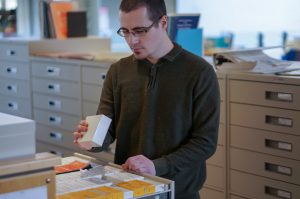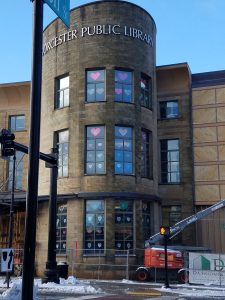by Gretta Cox-Gorton

What’s a public library to do when a global pandemic shutters its doors? While some of us were making banana bread, researching mutual aid, and figuring out how to get our eager hands on recent bestsellers, our public libraries and the librarians who staff them were hard at work trying to find ways of gracefully bridging the divide between in person and remote access to collections.
Enter Alex London, a reference librarian and subject specialist in Local History and Genealogy at the Main Branch of the Worcester Public Library. The Simmons alum has worked in libraries since he was a teenager, and has been in this position since 2015.
Day to day, London’s responsibilities are extremely similar to the other two dozen or so reference librarians at the WPL, including tasks such as assisting patrons at one of the library’s six service desks, performing regular collections maintenance, purchasing materials, and staffing the online chat reference service, answering questions from far and wide on topics of equal variety, like “was my item renewed?”, “are you taking donations?”, “how do I read ebooks on a laptop?”
Outside of these duties, London, in collaboration with another librarian, is

responsible for the library’s Local History and Genealogy collections, which contain thousands of printed materials such as books and periodicals, photographs, microform, and digital resources dedicated to Worcester’s cultural heritage. Researchers from all walks of life have come to the Worcester Public Library to access these historic collections, but the combination of a global pandemic and a long awaited, large scale renovation of the ground floor, Periodicals area, and Childrens Room have made it difficult to foster access. “Popular [historical] collections at the Worcester Public Library all have something to do with providing a sense of place” says London, as we sit down for our chat at a large table in the middle of the Local History stacks on the third floor, where countless patrons over the years have poured over city directories, yearbooks, and large, historical maps of Worcester county. It’s difficult to maintain a sense of place when the building is inaccessible to patrons and staff, respectively, and most of the materials in London’s charge can only be accessed in person.
With this barrier to access in mind, London and his coworkers are doing their best to tailor programming to bolster virtual accessibility. “The collections that get used the most are the most user-friendly”, he says, and the numbers back him up. Since the onset of the current global pandemic, the migration of programs to a virtual medium has exploded – participants have doubled, and oftentimes tripled, especially in classes relating to local history and genealogy. Classes which promise to impart practical skills in specific databases and online resources have done particularly well in the last few months, such as “Research Your Family History Through Digital Real Estate Records”, “An Introduction to Finding American Military Records for Genealogists”, and “Read All About it: Finding and Using Newspapers in Genealogy Research”. Beyond classes for unique audiences who need extra guidance, independent searches on databases such as Ancestry have more than quadrupled since last year. This has to do with the increased numbers of people now at home and becoming interested in tackling the family history, but also in the popularity of the programs and classes which focus on how to navigate important sources. In this regard, London’s position is one of a facilitator, not gatekeeper. Instead of relying on antiquated methods of information exchange, he can instead prioritize the creation of avenues for service, and can actively seek to connect researchers directly to resources. This is a crucial aspect of any cultural heritage professional’s responsibilities – democratizing the means of access to ensure transparency and to build trust in user communities.
Even though the pandemic has forced programming to be entirely online, and reference services have morphed, London finds optimism in the current building renovations at the Main library wrapping up and what the space will mean for community engagement in cultural heritage in a post-pandemic world. When asked about how the new and improved space would affect this relationship, he mentioned that the library is purchasing, amongst other kinds of technology, a VHS to digital file converter, which would allow patrons to bring in things like home videos and commit them to a variety of digital formats. London hopes that this technology will serve as an attraction, and promote the library as a center for patrons to not only discover their past, but to preserve it for the generations to come.
Further Reading
Worcester Public Library’s Local History and Genealogy Resources: https://www.mywpl.org/?q=local-historygenealogy
Worcester Public Library’s Online Program Calendar: https://www.mywpl.org/?q=online-calendar
